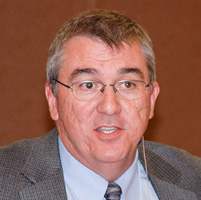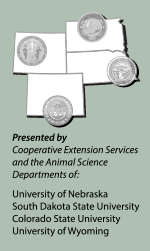Opportunities & Obstacles
for Breeding Cattle Exports
by Kindra Gordon, field editor, Angus Journal
RAPID CITY, S.D. (Dec. 5, 2013) — It is a big, changing world, and the export market is reflecting increased demand for livestock, Tony Clayton, president of Clayton AgriMarketing Inc., told attendees during the final session of the Range Beef Cow Symposium in Rapid City, S.D., Dec. 5. He credits the interest to the increasing global population and expanding economies.

Of the obstacles in marketing live animals, Tony Clayton, Clayton AgriMarketing Inc., calls disease concerns the biggest.
“Overseas, when you make more money you buy better food,” said Clayton, who specializes in live exports. His Jefferson City, Mo., company ships live U.S. animals — from beef and dairy cattle to goats and horses — for export about every six days.
Regarding the interest in beef cattle, Clayton said, “International producers want to adopt our genetic systems. When our corn prices were high, theirs were higher. They realized they’ve got to make animals more efficient and that starts with breeding systems and good genetics.”
Asked why these countries would want to import breeding stock as opposed to just buying boxed beef, Clayton explained it is a matter of national security.
“Hungry people are dangerous people,” he said. “The elderly leaders in many of these countries know and recognize that from the past, so regardless of what it costs, they want to be able to raise some of their own food for their countries.”
Countries that have been steadily importing dairy and beef cattle include Turkey, Russia, Kazakhstan and Iraq. Clayton anticipates that Mexico will also be a larger importer of beef and dairy cattle in 2014 as it begins to repopulate herds after drought.
Of the obstacles in marketing live animals, Clayton calls disease concerns the biggest. “Disease will influence the market,” he said. Foot-and-mouth disease (FMD) is especially a big concern to him. He stated, “In the U.S. we have to keep it out. We’ve got to do due diligence. If it happens here, we can’t export.”
Other issues he cited that are concerns included bovine spongiform encephalopathy (BSE), tuberculosis, avian influenza, and two new viruses — porcine epidemic diarrhea (PED) virus in swine and the Schmallenberg virus, which has been discovered in Europe.
“Russia, Egypt, Lebanon are examples of countries who don’t want cattle from Europe because of it (Schmallenberg virus). As long as the U.S. can keep it out, we will create export opportunities here,” he said.
Clayton is a proponent of animal identification (ID) in the United States. He said, “It is needed to get the U.S. and to keep the U.S. able to export to some of these countries. If we can get our arms around it (animal ID), it could take this cattle market to the next level.”
Clayton noted that exports make a huge impact to the economy:
- For every $1 billion in agricultural goods exported approximately 8,400 jobs are created;
- In 2011, livestock exports increased by 23% over the previous year to $951 million; and
- In 2012, livestock exports increased by 14%, making the industry a billion dollar industry for the first time.
Clayton spoke Thursday at RBCS XXIII. Visit the Newsroom at www.rangebeefcow.com/2013 view his PowerPoint, read his proceedings paper or listen to his presentation.
---------------------
The RBCS is a biennial educational symposium offering practical production management information. It is sponsored by the Cooperative Extension Service and animal science departments of the University of Wyoming, South Dakota State University, Colorado State University and the University of Nebraska.
Comprehensive coverage of the symposium is available online at www.rangebeefcow.com. Compiled by the Angus Journal editorial team, the site is made possible through sponsorship of LiveAuctions.tv and the cooperation of the host committee.
Editor’s Note: This article was written under contract or by staff of the Angus Journal. To request reprint permission and guidelines, contact Shauna Rose Hermel, editor, at 816-383-5270.


